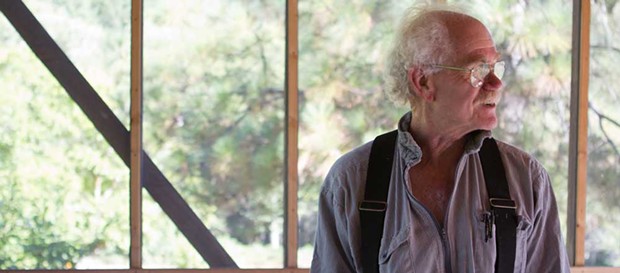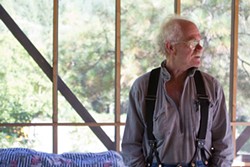Reflections on Black Bear
Fifty years later, a new book captures life on the commune
By Malcolm Terence[
{
"name": "Top Stories Video Pair",
"insertPoint": "7",
"component": "17087298",
"parentWrapperClass": "fdn-ads-inline-content-block",
"requiredCountToDisplay": "1"
}
]
I never would have written a book like this 50 years ago when we first started the Black Bear commune. We knew we had to keep secrets then. People mostly had only first names and even if we knew their last name it might have been invented. Maybe they were avoiding the military draft. Maybe they were just being careful. The sheriff would send in snitches to spy. The FBI would come by regularly looking for underground fugitives. The local police followed me in the first time I arrived there in the summer of 1968 and arrested me, mostly for possession of hair. It's a longer story, and it's Chapter 2 of the book. The chapter title is "The Recipe for Chimichangas, or How I Saved the Commune," and you can find it linked here. Clearly I was framed. Half the other guys in Yreka Jail told me they also were framed, so I fit right in.
About a year earlier, I'd left the world of news reporting to live with this big crowd of hippies. Some might call them "crazy hippies," but I reserve judgement. I was still a young man from a newspaper family so I'd been writing for papers since I was in my early teens. It was small papers and then big, even the biggest — the Los Angeles Times. But somehow it seemed that the world was changing faster than the world of news. South Central Los Angeles exploded in the Watts Riots on Aug. 11, 1965. My beat was the West Side, far from the unrest in South Central. "Unrest" understates it. Thirty-four people died, most killed by police and National Guard. More than 1,000 were injured. I watched hundreds of families escape from the war zone to Santa Monica beach, where they set up camp. It was safer than home.
When things settled down, I told my editors about the camps that had blossomed and asked them why they thought the big populations of black people on the West Side had not joined the melee. They just shrugged. I offered to write a piece about why the West Side black neighborhoods — we called them ghettoes — had stayed peaceful and they said to forget about it. News coverage has come a long way since those days.
Not too long after that I decided that my newspaper work was making me miss what was going on in the world so I left it behind. Before long some musician friends invited me to be their business manager and I couldn't resist. Their background was avant-garde and multicultural and their politics were revolutionary — a perfect mix for rock and roll. The band leader was Joseph Byrd, the same guy who later became a highly regarded music prof at College of the Redwoods. Record companies guessed that they could make money with us so we quickly had recording contracts and bookings across the country. Who knew there was a market for revolutionary culture? But a year-plus of that and it became a grind. There was continuous friction between the musicians, who were each very talented.
One week we played San Francisco and I met the Diggers. They were a theatrical gang who didn't just talk about changing society, they lived it, and they immediately won the attention of the national media. And my attention, too. I'd wearied of all-night recording sessions and back-to-back bookings, always on the threshold of imaginary fame and wealth, but never quite there. Before long I was in the mountains of Northern California at this commune just as it was getting started. It was a different world than anything I'd ever known or imagined. So I bailed on music much like I had on newspapering. You're not very patient in your mid-20s. That's where my book Beginner's Luck, Dispatches from the Klamath Mountains begins its tales.
Remember that the world was spinning like a brightly colored top in the 1960s and no one knew where it would land. People were organizing around issues of race and gender and against the war in Asia. A few years earlier, 1964, Lyndon Johnson, a Democrat, had run for the presidency against Barry Goldwater, and one of his campaign slogans was that a vote for Goldwater was a vote for a land war in Asia. Johnson won, but four years later our country was waist deep in a war in Vietnam. In other words, the world was going crazy, America was divided and it occurred to many young people that they needed to resist the corrupt insanity.
Sound familiar? Update the names of the presidents and move the land wars over a little way on the globe. It is some comfort that young people today are getting organized and standing up, just as we did 50 years ago.
I can't say that living at Black Bear commune with 60 other hippies was easy, but it was never boring. There were lots of communes in those days, some urban and others rural. Black Bear may have been the most remote. It is still there today but there has been much turnover in the years since I lived there. People would stay a few years, or a few days, to learn what they needed to learn. Most returned to cities but a few of us, me included, left the commune and stayed in the small river towns nearby. Some of the river locals were friendly, starting with some Karuk tribal members. A few shunned us and most just minded their own business.
But there were events and campaigns that brought people together. There were the first of the massive wildfires before everyone realized that fire was the new normal. There was the campaign to stop the use of herbicides in the forest. The Forest Service claimed it needed to spray to keep up the pace of logging but nobody, neither environmentalist nor logger, wanted their kids exposed to toxic chemicals.
And I began writing articles again for local papers, after what may be the longest hiatus from journalism in history. Among my favorites were the Two Rivers Tribune, published by the Hoopa Tribe, and the North Coast Journal. For a sampling, check https://bit.ly/2krxckC.
And I began to write this new book. It no longer seemed so pressing to keep the stories secret. History is written by the winners, they say. I've tried to write a history of the rest of us, as we lived it and watched it happening around us. I like that the young people around me — Native and white alike — are continuing the work that my generation began. That's certainly another book.
Editor's note: Malcolm Terence will share his new book Beginner's Luck, Dispatches from the Klamath Mountains, published by Oregon State University Press, at Northtown Books in Arcata on Friday, June 8, 7 p.m.
more from the author
-
From Orleans to the Capitol
Spreading Good Fire
- Dec 2, 2021
-
'Given These Songs'
Native singers gather to thank Brian Tripp; he thanks them back
- Jun 17, 2021
-
Fighting Fire with Fire
A devastating wildfire season highlights the need for prescribed burns
- Nov 5, 2020
- More »

































